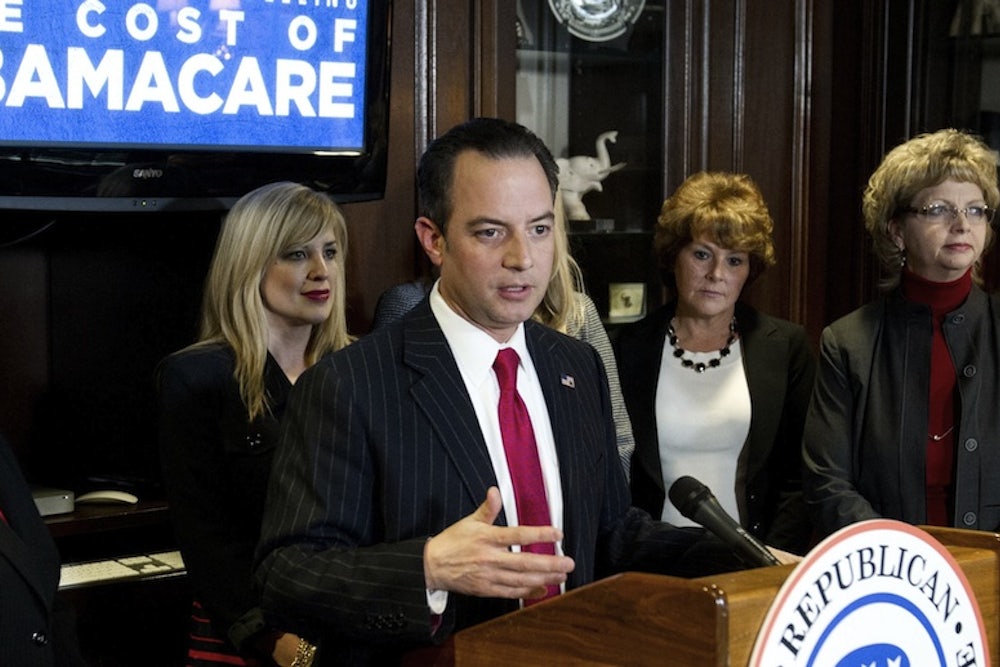Conservatives have a new favorite argument on Obamacare that, like so many right-wing talking points, is overdue for context and correction.
The claim is that the Affordable Care Act won’t do much good, because, even after the law has taken full effect, the number of uninsured Americans will be roughly the same as it is now. Last week’s report from the Congressional Budget Office has prompted several conservatives to make versions of this argument—among them, John Podhoretz of the New York Post:
Even more damaging is this projection: “About 31 million nonelderly residents of the United States are likely to be without health insurance in 2024, roughly one out of every nine such residents.”
Why? Because, in selling the bill to the American people in a nationally televised September 2009 address, President Obama said the need for ObamaCare was urgent precisely because “there are now more than 30 million American citizens who cannot get coverage.”
Now the CBO is saying that in 10 years about the same number of people will lack insurance as before. This, after new expenditures of as much as $2 trillion and a colossal disruption of the US medical system.
Two points here. First, Obamacare’s architects were out to do a lot more than simply help the uninsured get coverage. Among other things, they were also out to help the under-insured get better insurance—and to help people struggling with their premiums pay for them. Accomplishing these things is not easy. It requires setting a higher standard for insurance and then finding the money to help people get coverage that meets that standard. It’s these changes that have led to the disruptions like policy cancellations and premium increases. If conservatives like Podhoretz want to judge the law based on all of the law’s minuses—and that’s fine, it’s the proper way to evaluate a program like this—then they need to include all of the pluses, too. That means counting the benefits to the insured and the uninsured.
Second, and more importantly, conservatives would have you believe CBO thinks the new health law won't put a real dent in the number of uninsured. That's not at all what CBO said.
CBO actually starts with a much higher baseline for the number of uninsured—57 million non-elderly Americans—because of the data it uses. (Estimates of the uninsured vary a lot depending on which survey you choose and how you define the term.) And the Affordable Care Act, according to CBO, will reduce that number significantly. Without the law, CBO says, the number of uninsured Americans would stay at roughly 57 million. But thanks to the various coverage expansions—not just the creation of new private insurance marketplaces, but also the expansion of Medicaid and ability of young adults to stay on their parents’ plans—the number of uninsured will decline markedly. By 2017, according to CBO, Obamacare will have reduced the number of Americans without insurance by nearly half—or more, if you don't count undocumented workers.
These are obviously just projections, based on CBO's assessment of past programs that have made health insurance more widely available. There's a separate, totally legitimate argument over whether the law will actually reach these goals. My own guess is that it will fall a bit short in the first few years and then catch up over time. But it will be months and, really, years before we know whether that's happening—and that's not what folks like Podhoretz are arguing here.
In a follow-up for Commentary, Podhoretz defended his argument:
If 31 million uninsured was unacceptable in 2009 and the key fact in creating this new $2 trillion program, how could the projection that there will be 31 million uninsured in 2024 be considered an endorsement of ObamaCare’s success? In any case, what is missing from any such projection is the fact that one way or another, had there been no ObamaCare, there would still have been significant revision at some point of the health-care system, which everyone acknowledges is broken. Since we can’t know what other changes might have been made, we can’t possibly know how many uninsured there might have been in this alternate 2024.
No, we can’t know what other changes might have taken place. But we have a pretty good idea. Liberals settled on something like Obamacare, which they realize will reach only about half of the uninsured for now, because they had literally spent decades trying to do something more ambitious—only to fail, thanks in no small part to conservative opposition. And while conservatives like to say they have better ideas for reforming health care, their proposals inevitably result in many fewer people getting coverage—or those getting coverage getting significantly less financial protection.
As best as I can tell, most conservatives simply believe that the costs of significantly expanding coverage are too high to justify the benefits. Fine. But if they want to make that argument, they need to be candid about how significant those benefits are likely to be.
